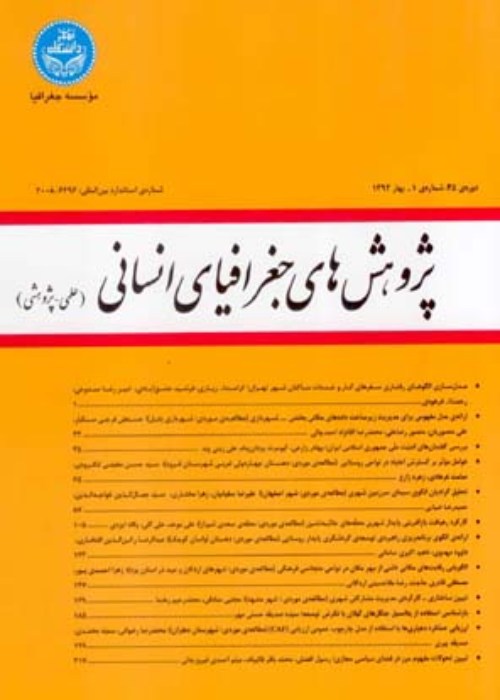Foundations of Political Identity of Iranian Kurds
Author(s):
Abstract:
Introduction
In recent decades the issue of «identity» has gained considerable importanc in social science studies، especially in the field of the Iranian political geography. Some experts argue that the factors affecting this growing process are affected by political، social، economic، regional and global changes، while others consider the existence of modern perspectives and attitudes especially in the field of post-modern thought as the cause of increasing interest in this issue. Certainly، internal factors، especially the Islamic Revolution and its consequences together with regional and global factors have led to more attention to the issue of identity. Meanwhile، ethnic identity has a special place، as Iranian society is composed of different ethnic groups that، throughout history، have contributed to maturity، survival، and sustainablity of Iranian civilization، and despite many ups and downs، have been able to maintain the political life of this country in different ways. In Iran، like other countries composed of ethnic groups، the issues of ethnic identity have been integrated into issues related to national unity and security of the country. In that، because، on the one hand، ethnic identities can play an effective role in the national unity of the country، and on the other hand، they are able to substitute the idea of separatism and disintegration with that of national unity and security by placing their growing expectations and demand. one of the collective identities studied in political geography is “political identity”. According to some، factors such as common history، common interests and shared political fate are some of the factors forming political identity. Studying political identity or political aspects of Kurdish identity requires analysis of the components of political identity among the Kurds. The key question is: “what is the political identity of Kurds and which factors affect their political identity?” According to the main hypothesis of the present study، due to familiarity with new knowledge sources and different local experiences، the Kurds have a fluid political identity. Methodology
This research is an applied research conducted through library method and descriptive - analytical approach. In the present study، using documents، it has been tried to determine how components such as common history، common interests and shared political fate form Kurdish political identity. The most important element in this regard is investigating «ethnic nationalism» and «inter- and intra-ethnic political conflicts». The results show two basic elements of such movements، namely «seeking help from foreigners» and «internal demands»، while they are in contrast with Kurd ethnic identity but affected by ethnic relations and ethnic identities. Activity of Kurds and Kurdish parties after the Islamic Revolution so far also implies that how these activities have affected political identity of Iranian Kurd people. Results And Discussion
Based on the research conducted about political identify foundations of the Iranian Kurds، it can be atgued that: first، «ethnic identity» foundations of Iranian Kurds affect their “political identity” because of the associations of their historical roots with Iran and the Iranians history، based on the elements of territory، race / ethnicity، religion، language، customs / traditions، and beliefs / values; second، the study of the foundations of «political identity» of Kurds in Iran indicates that common interests of the Kurds in political areas date back to Kurds’ contemporary history because dividing Kurdish regions among Iran، Turkey، Iraq and Syria have created another fate for the Kurds، dividing Aryan race and Iranian Kurds with Kurdish language and Islamic religion and Shiite religion / Sunnis among the four Countries. Since then، the shared interests among the Kurds within and out of the country and political common fate that have kept them away from each other can be traced as two issues of ethnic nationalism and political conflicts: firstly، Kurd ethnic nationalism in Iran reflects the political diversity in political domain. That is، they are not in complete agreement with both national identity and the official discourse of nationalism in the country. Second، the identity foundations of Kurds and their political performance in recent one hundred years reflect two types of political conflict in the Kurdish region of Iran: first، «intra-ethnic conflict» based on power acquisition or competition among the different Kurd tribes. In these types of conflicts، the behaviors، norms، attitudes and positions of Kurds are mostly affected by the foundations of ethnic identity، structure of ethnic relations and tribal policies governing Kurdish region، such as the impact of tribal politics on performance «SEMCO». Second، «inter-ethnic conflicts» which were first based on preservation of the internal influence of tribes، and later were based on autonomy acquisition or independence. In this group of disputes، the dual elements namely «seeking help from foreigners» and «domestic demand» are important forces of the “political identity of the Kurds” within the triple elements of «common history»، «common interests» and «common political destiny». Conclusion
After the events following the Islamic Revolution، and by increasing the level of education، we witness the gradual increase in political consciousness of Kurds، and the performance of “ethnicity-based nationalism «without» tribal culture«among the Kurds. The Kurds’ political relations are influenced by party relationships and political groupings. Previous experience shows that whenever the central government enjoys a high level of power، it has been able to exert political power on all areas and، in contrats، every time this government is weak، different ethnic groups have upraised in different parts of Iran. In all of these events، due to the promotion of education and assignment of Kurd educated leaders we witness the removal of tribal relationships and emergence of party relationships with ethnic culture combined with some form of ethnic consciousness to gain autonomy. Of course، one can not speak about the political identity of Kurds because there is a long way to the formation of a Kurdish political community forming Kurdish political identity. However، it can be argued that awareness of the fate of the Kurdish political fate that often evokes their innocence، leads to common feeling among the Kurds so that they are demanding common interests trying to get rid of victimization.Keywords:
Language:
Persian
Published:
Human Geography Research Quarterly, Volume:45 Issue: 85, 2013
Pages:
95 to 120
magiran.com/p1174597
دانلود و مطالعه متن این مقاله با یکی از روشهای زیر امکان پذیر است:
اشتراک شخصی
با عضویت و پرداخت آنلاین حق اشتراک یکساله به مبلغ 1,390,000ريال میتوانید 70 عنوان مطلب دانلود کنید!
اشتراک سازمانی
به کتابخانه دانشگاه یا محل کار خود پیشنهاد کنید تا اشتراک سازمانی این پایگاه را برای دسترسی نامحدود همه کاربران به متن مطالب تهیه نمایند!
توجه!
- حق عضویت دریافتی صرف حمایت از نشریات عضو و نگهداری، تکمیل و توسعه مگیران میشود.
- پرداخت حق اشتراک و دانلود مقالات اجازه بازنشر آن در سایر رسانههای چاپی و دیجیتال را به کاربر نمیدهد.
In order to view content subscription is required
Personal subscription
Subscribe magiran.com for 70 € euros via PayPal and download 70 articles during a year.
Organization subscription
Please contact us to subscribe your university or library for unlimited access!



